The Benefits of an Integrated Management System (IMS)
March 28,2022 / Haroon Juma / ISO Standard

Attaining several ISO standards delivers benefits to your organisation. Once the certification is achieved, attention should turn to manage the ISO implementation requirements to support the surveillance audit and recertification. Several standards could lead to multiple management which can be avoided through an Integrated Management System(IMS).
IMS stands for Integrated Management System which seeks to integrate all components of a business for ISO 9001, ISO 14001, and ISO 45001. IMS combines all aspects of an organisation’s systems, processes, and standards into one smart system. This merger enables a company to rationalize its management, save time and increase its efficiency by dealing with all elements of the overall management system.
Integrated management applies to any organisation, irrespective of its size or sector, looking to integrate two or more of its management systems into one cohesive system with a holistic set of documentation, policies, procedures, and processes. In general, organisations that are more receptive to this product will be those with mature management systems and who wish to introduce other management systems into their organisation with the benefits they bring.
You can integrate any management system. For example, instead of holding audits for each Standard, you will only need to hold one. An IMS allows these processes to be combined so that they simultaneously cover all Standard-specific requirements.
IMS = QMS + EMS + SMS + EnMS + FSMS + ISMS (etc)

Implementing IMS is an ideal way to cover all the objectives at once. Achieving each objective may be difficult or confusing in an organisation but with having IMS, all the objectives can be fulfilled at once and makes the process easier and simpler to understand.
There are several benefits you need to understand to get an IMS in your organisation. This standard provides numerous advantages, including:
1. Fix in any size and complexity: IMS is easy to maintain for any type of organisation whether SMEs or larger enterprises. IMS implementation follows the process in which an organisational study occurs. Although the process or structure of an organisation is simple or complex, IMS takes this into account with the objective of supporting the process of a consultant or certification body.
2. Optimise processes and resources: Resources can be maximised by focusing on process implementation and value-added rather than additional system maintenance. When referring to standard requirements, do not consider it as a workload or task added to the organisation, instead, they are a way of implementing customer expectations, interested parties, and create a smooth and effective process.
3. Maintain the set of policies: IMS helps to maintain the policies from both ends, from an organisation point of view and government regulatory. IMS defines policies, and a set of rules has to be followed for the improvement of an organisation.
4. More efficient and effective: Integrated management systems have a positive impact on specific management system components and outcomes such as improvements in quality, safety, risk, and productivity. Therefore, your organisation can achieve effectiveness and efficiency in all the processes and operations by implementing IMS.
5. Cost reduction: Integrated Management Systems allows your organisation to conduct integrated audits and assessments, as well as optimise processes and resources. This helps you to save the cost in the maximum possible way as the resources are used at their best and waste is prevented. The cost for auditing different ISO will somehow expand the monetary resources and to overcome or save that IMS will bring advantage to an organisation.
6. Continuous improvement: IMS helps to monitor the activities continuously and find the differences for continuous improvement. IMS also suggests ways to eradicate those problems and in a manner it can be clearly worked out. This can support challenges such as scaling the operations to support expanding the market share to make the system more effective.
7. Sets a clear image: IMS presents a clear image of an organisation. It shows that an organisation projects a positive brand to its employees, environment, and quality standards. To build stakeholder confidence and maintain loyalty, it is of added value to implement an IMS.
8. Reducing Maintenance: Maintenance refers to the ongoing compliance audits and adherence to the requirements of the management system standards. When you have an integrated management system you can maintain the requirements concurrently, streamlining the process and allowing the organisation to focus on improvements rather than maintaining multiple systems when that is unnecessary.
9. Time management: IMS merges all the activities and focuses on every process which provides better time management. All the operation and management activities can be completed in a timely manner with effective use of time and resources.
10. Better communication: IMS helps enhance communication by addressing all requirements. Horizontal and Vertical tasks can be performed in an appropriate manner by integrating and aligning activities.
The beauty of building one Integrated Management System (IMS) is that while the risks identified may be numerous and varied- when it comes to actions to deal with them, there is often a convergence. The same operational controls may address quality and environmental, as well as health and safety risks. Ensuring that the systems are integrated into the organisation’s business processes leads to more effective and efficient adoption of multiple standards.
If you are on a tight budget and considering having more than one standard, then you should consider having IMS as it is the most effective and useful to have for an organisation. IMS will provide and lead the organisation in its continuing goal of improving its business and strategic planning.
About SimplySolved
SimplySolved is an ISO 9001 & 27001 Certified company and a Exemplary Accredited training center. We know how to help you successfully realise the full potential of implementing ISO standards and QMS.
Subscribe to mailing list
Partner With SimplySolved
SimplySolved is an ISO 9001 & 27001 Certified company and a Exemplary Accredited training center. We know how to help you successfully realise the full potential of implementing ISO standards and QMS.
From documentation toolkits to full spectrum consulting, whether a small or large enterprise, our approach is tailored to implement the right standards successfully to maximise your investment.


